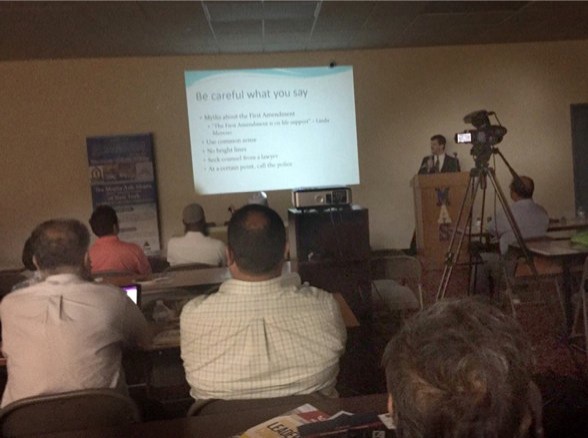The conference was designed specifically to address legal and social issues facing the Muslim community in Queens and across America. Attorneys and other subject matter experts gave presentations on various topics related to running mosques and other Muslim nonprofit organizations.
MLFA said that whether it’s the Muslim ban, immigration delays, watch lists, compliance-related nonprofit revocations or women’s access to mosques, American Muslim community leaders face many legal and social challenges as their religious community comes under greater administrative scrutiny. Lawyers said understanding these challenges is the first step in safeguarding the organizations and the communities they serve.
One presentation by Charles Swift, director and counsel at the Constitutional Law Center for Muslims in America, focused on dealing with informants in the community. Swift discussed the First Amendment and how to spot and protect yourself from an informant. Swift clarified that there are limits to free speech and that even an attempt to do something illegal can be considered a conspiracy.
“A conspiracy to agree to do something illegal, even just an attempt is against the law,” he said. “They can agree with you to do an illegal activity, which would be a conspiracy. To agree to do something illegal is itself illegal. So an informant wouldn’t do anything violent, but they absolutely can help you break the law.”
He said informants cannot let somebody do something violent, but they can let someone agree to do it. He offered tips on how leaders can protect their community. He said there are very vulnerable members of every community who are easily manipulated and, in some cases, people can have an intellectual deficiency or are very needy and want friends. Swift said informants try to become their friends so they often prey on the neediest members of society.
“It’s good to know how to talk to people,” he said, “Especially needier people who might be a victim of entrapment attempts. The First Amendment is on life support. What that means is that while you cannot be arrested for most kinds of speech, speech can serve as evidence of your predisposition to commit am crime. For instance, people need to know the First Amendment does not prevent speech from being used as evidence. Use common sense, train the vulnerable in your community to use common sense. If someone in the mosque is starting to use violent rhetoric or talk about some sort of criminal plans, it’s probably an informant.”
Other presenters included Khalil Meek, executive director of the MLFA; Shari Crittendon, attorney at the Constitutional Law Center for Muslims in America; and Sarrah Buageila, project manager at the Institute for Social Policy and Understanding.
/323
source : TimesLedger
Tuesday
1 August 2017
6:30:43 AM
845414

(AhlulBayt News Agency) - Muslim community leaders gathered in Astoria for a legal conference featuring some of the country’s top civil rights lawyers. The Muslim Legal Fund of America hosted the Muslim Nonprofit Leadership Conference all-day Saturday at the IBN SINA Center at 46-01 20th Ave. Topics discussed ranged from the travel ban, immigrant rights and mosque operations.
